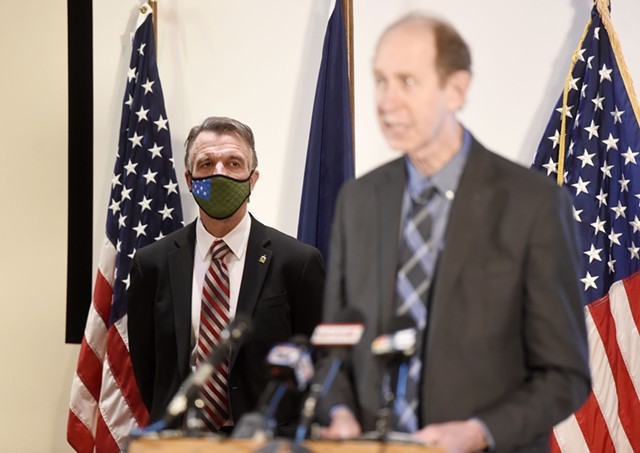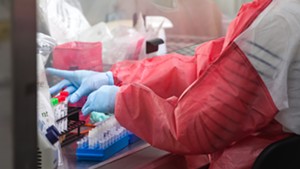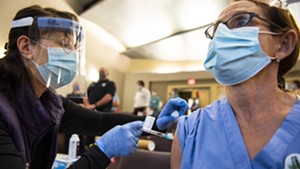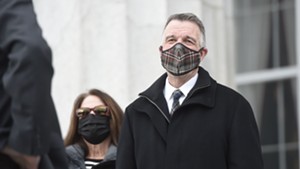
- File: Jeb Wallace-Brodeur
- Gov. Phil Scott and Health Commissioner Mark Levine at a previous briefing
A new state rule Vermont officials unveiled on Tuesday is intended to increase the rate at which Black, Indigenous, and other people of color are vaccinated against COVID-19.
Starting next week, BIPOC Vermonters eligible for a vaccine can bring household members to be inoculated, even if they aren’t otherwise eligible. The state employed a similar strategy for New American households.
The move comes in response to data that shows BIPOC Vermonters have been more likely to be infected with COVID-19, Health Commissioner Mark Levine said on Tuesday during one of two weekly briefings on the coronavirus. They are also less likely to obtain vaccinations than white, non-Hispanic Vermonters, he said.
BIPOC Vermonters make up only 6 percent of the state’s population but have had 18 percent of its COVID-19 cases, Levine said, with significantly higher rates of hospitalization. About 20 percent of white Vermonters have received at least one dose of the vaccine, compared to 9 percent of Black Vermonters and 3.8 percent of Indigenous Vermonters.
Nationally, research shows that only about 42 percent of Black people say they will definitely get the vaccine, compared to 60 percent of white people, according to
a survey from the Pew Research Center.
“We are working with community organizations to try to rebuild the trust in public health that has eroded through historical injustices, and to expand access to education and outreach,” Levine said.
The news comes as case counts have risen recently in Vermont. There were 901 new cases during the week ending on Monday, compared to 694 the week before, Finance Commissioner Michael Pieciak told reporters. The rise amounts to about 130 new cases per day. The weekly number was the most the state had reported in a month.
Pieciak said the increase can’t just be attributed to a recent outbreak that infected about 130 inmates at the Newport prison.
Despite the high number of cases, Pieciak said hospitalization rates are falling, and he expects death rates to decrease significantly in the coming weeks. Some of it has to do with a vaccine campaign that has targeted the elderly and others most at risk of serious illness from COVID-19.
“There are greater reasons for hope today than at any other time during the pandemic,” Pieciak said.
Gov. Phil Scott and his administration outlined a few other changes on Tuesday and promised more are coming soon. Among them is a much-anticipated move to ease the gathering rules so that more than one household at a time can get together.
Vaccinated Vermonters are allowed to gather with others who have been vaccinated, as well as with one household that hasn’t been. With Vermont’s testing positivity rate at 1.7 percent — down from more than 3 percent at its January peak — Scott said he would announce new guidelines on Friday for Vermonters who haven’t been vaccinated.
“This will have an impact on other areas like restaurants, too, so stay tuned,” he said.
The state had vaccinated 127,500 people against COVID-19 as of Tuesday, and 68,900 of them were fully covered by first and last doses.
The state has been rolling out vaccine registration according to age bands, starting with the oldest Vermonters. On Monday, it opened registration to a new group: those 55 and over with health conditions that put them at greater risk of complications from COVID-19. Only about 10,000 people signed up — much less than expected in a cohort with an estimated 75,000 people in it.
The low figure will allow the state to open up registration earlier for those with high-risk conditions between the ages of 16 and 55. They can start signing up on Thursday.
“The good news is so far we've seen a high uptake rate, with over 80 percent of those in the 75-plus age bands having received at least one dose,” Scott said. “The high acceptance rate is something we need to continue to strive for, so let's keep it up by signing up when it's your turn.”
Reports of vaccine waste nationally and in Vermont have picked up as the pace of vaccinations — now about 4,000 a day in Vermont — has accelerated. Once removed from storage, the vaccines must be used within a certain time or must be thrown away. Accordingly, some Vermonters have been visiting drug stores at the end of the day to see if there are leftover doses available.
Levine said 458 doses have been wasted or determined not to be viable in the state — about 0.2 percent of all the doses the state has received. Administrators have a "priority list" of people to contact in the event there are leftover doses.
But “at the end of the day, if there is no one, then don’t waste that dosage, get it into somebody’s arm,” Smith implored of hospitals, pharmacies and other clinics providing the shots.
The state opened vaccine sign-ups to Vermonters age 65 and older on March 1. More information about the subsequent age bands should be released within the next two weeks, Scott said.
Smith on Tuesday also set the record straight on the topic of vaccines for out-of-staters. New Hampshire and Vermont have an agreement, Smith said, to vaccinate people who live in one state but work in health care, schools, or public safety in the other.
The Dartmouth-Hitchcock health care system has vaccinated more than 2,000 Vermonters, mostly health care workers who live in Vermont and work at Dartmouth, Smith said. Vermont, meanwhile, has vaccinated 5,500 people from out of state, most of them workers in health care or long-term care.
“This was essential to keeping Vermont healthy … and to keep a stable workforce in the health care field,” Smith said.
A U.S. Census survey shows that 70 percent of unvaccinated Vermonters definitely plan to be vaccinated, Pieciak said, a number that puts Vermont first in the country.
“But as you can also see, there's still a significant number of people who are unsure about the vaccine,” he said. “Getting vaccinated is the key to getting out of the pandemic.”

















Comments
Comments are closed.
From 2014-2020, Seven Days allowed readers to comment on all stories posted on our website. While we've appreciated the suggestions and insights, right now Seven Days is prioritizing our core mission — producing high-quality, responsible local journalism — over moderating online debates between readers.
To criticize, correct or praise our reporting, please send us a letter to the editor or send us a tip. We’ll check it out and report the results.
Online comments may return when we have better tech tools for managing them. Thanks for reading.